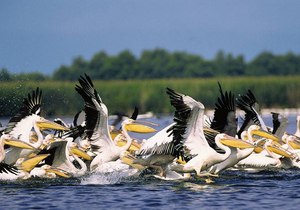International Conflicts
Pressure on the water resources of the world is increasing. Due to population growth and the increase of irrigation, water use has gone up, resulting in ever more competition over water resources. Moreover, the water that is available is often polluted. To exacerbate the problems, climate change may change rainfall patterns, reduce water availability and increase flooding.
Worldwide, there are more than 260 international river basins, covering more than 45 % of the earth’s land surface. Water problems in these basins can develop into major international conflicts, and many people fear that the wars of the 21st century will be over water. Fortunately, there is also a lot of international cooperation on water issues. The most common and powerful factor promoting cooperation is the wish to develop or maintain good international relations. When relations are good, countries are willing to compromise on some points that are more important for the other countries than for themselves, trusting that this will be reciprocated. Investing in good relations usually has long-term benefits for all countries concerned that outweigh the short-term benefits of less co-operative behaviour.

Pelicans in the delta of the Danube, with 18 basin countries the most international river of the world (Photo: Goliath, commons.wikimedia.org/wiki/File:Pelicani_din_Delta_Dunarii.PNG)
International river basin management is often highly political, but there is a large role for information exchange and joint research. Information exchange and joint research can help to identify joint development potentials and can result in a common factual basis for reaching agreement. Moreover, it can be a good first step in developing co-operation: it can help to develop trust. In addition, good information increases the likelihood of agreements that are technically and economically feasible and produce no unforeseen negative side-effects. Finally, independent research by universities may sometimes act as a referee in technical controversies.
The Chair has conducted research on international cooperation (see for instance the NeWater project) and on the hydrology of international river basins.
More information: Erik Mostert